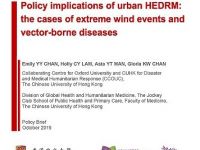Natural hazards have direct and indirect health impacts. Apart from physical and mental trauma, other health impacts include malnutrition, disrupted disease treatment plans, and risk of infectious diseases. Health impacts may be mitigated through health-related emergency and disaster risk management (Health-EDRM). They are systematic analysis and management of health risks through the reduction of hazards and vulnerability in all stages of the disaster management cycle, from prevention/mitigation, preparedness, response to recovery (Lo et al., 2017; World Health Organization [WHO], 2019).
更多詳情You are here
相關文章 "policybriefs"
2019
2018
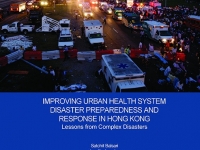
全球天然災難發生頻率與日俱增,帶來不少棘手問題,災難管理及應變工作亦漸趨複雜。事故指揮系統、處理大型傷亡訓練、檢傷分類守則、跨部門溝通策略,以及能源、專業人員及儀器支援系統,近年在質素及知識層面上皆顯著提升
更多詳情2017
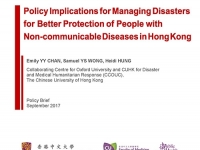
在2005年至2014年間,災難為全球造成1.4千億美元破壞,17億人受影響,以及70萬人死亡。受氣候變化、市區化、環境惡化及貧窮問題影響,全球災難發生頻率及嚴重程度日增。有效的災難管理策略,需滿足受影響災民的公共衞生需要。非傳染性疾病能導致患者死亡,屬全球現時主要醫療負擔,傳統人道救援未能處理他們在災難及突發情況的需要,各界需關注非傳染性疾病患者的人道救援情況及相關管理。
更多詳情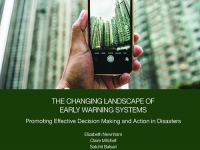
早期預警系統對保護市民免受災難傷害極為重要,剛發表的仙台減災綱領提出,改善早期預警系統應為各地政府優先處理目標,包括香港在內的多個地區皆已發展早期預警系統,然而通訊科技不斷轉變,資訊網絡繁多、訊息發布頻率高,為早期預警系統帶來機會與挑戰
更多詳情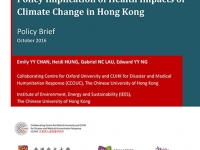
氣候變化是全球在二十一世紀主要面對的環境轉變,市區人口密集,依賴基建處理基本求生需要,容易受氣候引致的災難影響。此政策簡報旨在檢視和探討氣候變化為香港帶來的公共衞生影響,並提出建議支援建設社區抗災能力,應對氣候變化在在未來數十年帶來的挑戰。
更多詳情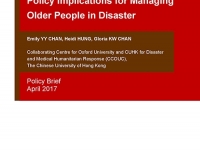
Between 2005 and 2014, disasters have caused total damage of US$1.4 trillion worldwide, with 1.7 billion people affected and 0.7 million killed. With climate change, urbanization, environmental degradation and poverty, the world has been experiencing disasters at a higher frequency and intensity. At the same time, global population is ageing at an unprecedented speed: between 2015 and 2030, the number of persons aged 60 years or over in the world is projected to grow by 56%, from 901 million to more than 1.4 billion. Older people therefore is going to be an increasingly important group, in terms of both their contribution and vulnerabilities, in the face of disasters. This paper discusses the disaster-related health risks of the older people in Hong Kong, and presents key policy recommendations for better protection of this vulnerable group.
更多詳情2016
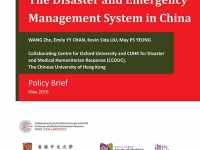
2003年非典型肺炎流行病爆發,促使中國改革應急管理系統。中國政府在2007年訂立及通過《中華人民共和國突發事件應對法》,旨在防止及減少突發事故、在事發時作合適救援、控制對社會造成的嚴重影響、監管應變工作、保障人民性命財產安全,以及維持社會秩序、國防及環境安全;並在立法後重整應急管理系統架構,在應急醫療系統帶來多項改變
更多詳情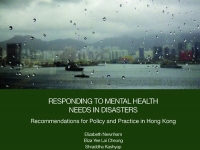
This policy brief is a part of the related research of the HKJCDPRI 5-year project. It outlines the existing emergency and disaster response system, a 3-tier system currently operating in the Hong Kong Special Administrative Region (HKSAR). Despite past epidemics, there remains a low level of community awareness, participation in basic first aid training and emergency preparedness.
The authors present recommendations which target to strengthen the response systems, to develop a competent and knowledgeable workforce, and to reduce the loss and suffering that occur during unexpected disasters. Engaging relevant stakeholders in contingency planning and equipping them with knowledge and skills on disaster preparedness; providing accessible information; organising drills and integrating
更多詳情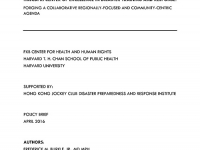
香港賽馬會災難防護應應變教研中心在2014年成立,旨在為香港及亞太區災難防護應變工作的發展建立實證基礎。此政策簡報考慮全球應急系統從政府主導轉向社區特性主導、世衞進行應急醫療隊協調及認證機制的情況,為香港賽馬會災難防護應應變教研中心設定詳細工作大網,包括推行社區抗災能力優先的研究及培訓項目
更多詳情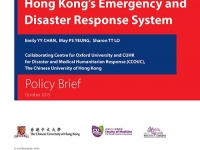
此政策簡報屬香港災難防護應變教研中心五年計劃的相關研究項目,概述香港特別行政區現行三層式緊急事故及災難應變系統,又指出雖然香港過去曾受流行病威脅,公眾防護意識仍見薄弱,基本急救訓練及災難防護工作的參與度亦有不足。
此政策報告作者提出多項建議,鞏固災難防護系統,培訓具專業能力及知識的災難管理人才,從而減少不能預計災難帶來的損失及傷痛。這些建議包括增強相關持分者制訂突發事故應變方案的參與度、為他們提供災難預防的知識及技術、向社會向界提供相關資訊、舉行災難演習,以及提供心理社會相關服務
更多詳情


